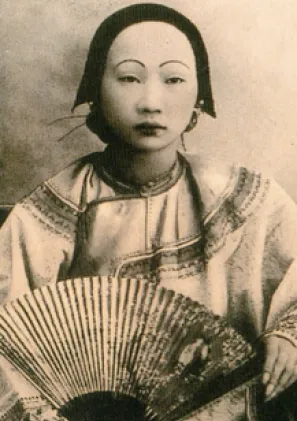Biography
1799 - 1862
Born the daughter of a merchant and marrying a merchant herself, Wu Zao yearned for something more than friendships with women. As a result of her desire she wrote several blatantly erotic poems to courtesans. Popular during her life time, Wu Zao’s poem/songs were sung throughout China. Her casual style, personal tone, and clearly homoerotic verse set her apart from the women poets of the era. From ‘For the Courtesan Ch’ing Lin’: “You glow like a perfumed lamp in the gathering shadows. We play wine games and recite each other’s poems. Then you sing ‘Remembering South of the River’ with its heart breaking verses. Then we paint each other’s beautiful eyebrows. I want to possess you completely – your jade body and your promised heart. It is spring. Vast mists cover the Five Lakes. My dear, let me buy a red painted boat and carry you away.” In the same poem she refers to “leaning against the bamboos,” which is a common phrase of longing by male poets of the age. Her other notable poems include ‘Bitter Rain In My Courtyard’ and ‘I Have Closed The Double Doors.’ Later in life she became a Taoist priestess and lived in monastic seclusion. Nothing is known of her death. Wu Tsao is usually regarded as the third woman poet of China, after Li Ch’ing-chao and Chu Shu-chen, and with Ne-Ian Hsin-te as one of the two leading tz’u poets of the Ching Dynasty. Despite excellent translations of seven of her by poems by Kenneth Rexroth and Ling Chung, her blatant theme of lesbian desire seems to have hampered this trailblazing poetess’ work from being known to Western audiences.
1799 - 1862
Born the daughter of a merchant and marrying a merchant herself, Wu Zao yearned for something more than friendships with women. As a result of her desire she wrote several blatantly erotic poems to courtesans. Popular during her life time, Wu Zao’s poem/songs were sung throughout China. Her casual style, personal tone, and clearly homoerotic verse set her apart from the women poets of the era. From ‘For the Courtesan Ch’ing Lin’: “You glow like a perfumed lamp in the gathering shadows. We play wine games and recite each other’s poems. Then you sing ‘Remembering South of the River’ with its heart breaking verses. Then we paint each other’s beautiful eyebrows. I want to possess you completely – your jade body and your promised heart. It is spring. Vast mists cover the Five Lakes. My dear, let me buy a red painted boat and carry you away.” In the same poem she refers to “leaning against the bamboos,” which is a common phrase of longing by male poets of the age. Her other notable poems include ‘Bitter Rain In My Courtyard’ and ‘I Have Closed The Double Doors.’ Later in life she became a Taoist priestess and lived in monastic seclusion. Nothing is known of her death. Wu Tsao is usually regarded as the third woman poet of China, after Li Ch’ing-chao and Chu Shu-chen, and with Ne-Ian Hsin-te as one of the two leading tz’u poets of the Ching Dynasty. Despite excellent translations of seven of her by poems by Kenneth Rexroth and Ling Chung, her blatant theme of lesbian desire seems to have hampered this trailblazing poetess’ work from being known to Western audiences.
Demography
Demography
Gender Female
Sexual Orientation Lesbian
Gender Identity Cisgender
Ethnicity Asian/Pacific Rim
Faith Construct Buddhist
Nations Affiliated China
Era/Epoch Chinese Qing Dynasty (1644-1911)
Field(s) of Contribution
Author
Poet
Theater
Demography
Gender Female
Sexual Orientation Lesbian
Gender Identity Cisgender
Ethnicity Asian/Pacific Rim
Faith Construct Buddhist
Nations Affiliated China
Era/Epoch Chinese Qing Dynasty (1644-1911)
Field(s) of Contribution
Author
Poet
Theater
Resources
Resources
https://en.wikipedia.org/wiki/Wu_Zao
https://secretlesbians.tumblr.com/post/73884729256/wu-zao-or-wu-tsao-is-considered-one-of-the-great
https://biandlesbianliterature.tumblr.com/post/170238378589/secretlesbians-wu-zao-or-wu-tsao-is
https://theinkbrain.wordpress.com/2011/10/29/wu-tsao-three-sapphic-poems/
Resources
https://en.wikipedia.org/wiki/Wu_Zao
https://secretlesbians.tumblr.com/post/73884729256/wu-zao-or-wu-tsao-is-considered-one-of-the-great
https://biandlesbianliterature.tumblr.com/post/170238378589/secretlesbians-wu-zao-or-wu-tsao-is
https://theinkbrain.wordpress.com/2011/10/29/wu-tsao-three-sapphic-poems/
